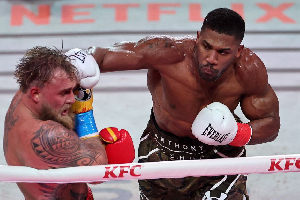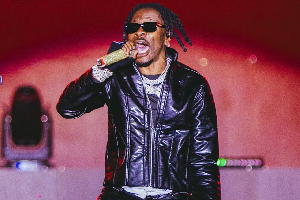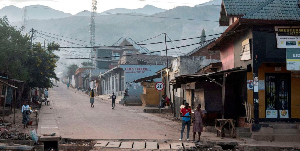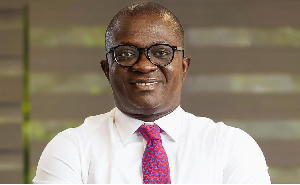What comes to mind when President J.E.A. Mills says: “I do not think this military option is going to bring peace in Cote d’Ivoire. I don’t want to be saddled with problems we cannot solve. We have our own internal problems”? JusticeGhana unmasks the political and indeed the diplomatic veil...
The OmanbaPa Research Group
SUMMARY
This article discusses the Ghanaian Government’s apparent nervousness in contributing towards the said use of force to oust the embattled Laurent Gbagbo from his position as Ivorian president. The OmanbaPa Research Group provides in abstract the establishment [of] and the changing roles of the Economic Community of West African States (ECOWAS) at the last-quarter of the 1990s. We will use the overthrow of President General Samuel Doe of Liberia in 1989 and the events that took place shortly after 25 May 1997, when Major Johnny Paul Koroma ousted Ahmad Tejan Kabbah as president of Sierra Leone and the role played by ECOWAS and the then Ghanaian leadership, as case study. JusticeGhana considers these in the context of regional peace and security and the United Nations/ECOWAS’ policies on non-interference in internal political affairs of sovereign independent states. We conclude on President Mills’ uncertain political fate and diplomatic” stance on this crisis.
INTRODUCTION
On 25 May 1997, a military junta led by Major Johnny Paul Koroma kicked out Kabbah's one-year old government of national unity from political power. Peter A. Dumbuya (2008) states that the then 33-year old major, had been held at the Pademba Road Prison pending trial for his alleged involvement in the September 1996 abortive coup d'état against the government. “Hours after his release from the central prison, Koroma, whose trial was scheduled to commence on May 26, announced the formation of the Armed Forces Revolutionary Council (AFRC) and called upon Nigeria to release from detention the leader of the Revolutionary United Front (RUF), Foday Sankoh, whom he then invited to join the military junta as vice president,” said Dumbuya. History has it that Kabbah appealed to General Sani Abacha of Nigeria, the then chairman of ECOWAS, for military help under the Status of Forces Agreement (SOFA) and other bilateral agreements to restore his government to power. So, why can’t President-elect Alassane Ouattara rely on this authority to restore peace in Ivory Coast?
The Rules and Principles of Use of Force in International Law
Article 2(4) of the UN Charter states that: “All members shall refrain in their international relations from the threat or use of force against the territorial integrity or political independence of any state, or in any other manner inconsistent with the purposes of the United Nations.” The use of force by states is controlled by both customary international law and by treaty law. For the purposes of the 1945 Charter, it seems to JusticeGhana.com that whereas the sitting President Gbagbo is in position to exercise this sovereign power of self-defence, ECOWAS/Ouattara seems to have no locus standi.
Indeed, most international law realists and political commentators have argue that this principle is now to be considered as part of customary international law, which has the effect of banning the use of armed force except for two situations authorised by the UN Charter: (1) the Security Council- under powers granted in articles 24 and 25, or Chapter VII of the Charter, which may mandate collective action to maintain or enforce international peace and security. Then is Article 51 which also states: "Nothing in the present Charter shall impair the inherent right to individual or collective self-defence if an armed attack occurs against a state." Yes, those apart, are the emerging but controversial claims that states might have a right to intervention in internal political affairs of other states on ground of humanitarian intervention, reprisals and the protection of nationals abroad.
Here, ECOWAS seems to have no evidential proof to link Laurent Gbagbo-led government to human right abuses. But Hugo Odiogor writes in Nigerian Vanguard online newspaper (25 December 2010) that embattled Laurent Gbagbo may face trial at the International Criminal Court (ICC) for crimes against humanity if he allows his country to slip into a second round of civil war following his refusal to relinquish power in Cote d’ Ivoire, where hapless citizens and nationals of other countries have become targets of desperate attacks by people suspected to be supporters of the out of favour leader. If these were to be so then any country, including members of the ECOWAS being affected by Gbagbo’s [in] action, could be able to rely on the traditional customary rules on self-defence derive from the Caroline Case- an early diplomatic incident between the US and the UK over the killing of some US citizens engaged in an attack on Canada, then a British colony. The case established that:
..there had to exist “a necessity of self-defence, instant, overwhelming, leaving no choice of means, and no moment of deliberation,' and furthermore that any action taken must be proportional, since the act justified by the necessity of self-defence, must be limited by that necessity, and kept clearly within it.” Admitted that some lives- both foreign and Ivorian citizens, are being probably lost as the result of this stand-off, we doubt whether ECOWAS could make a case against Ivory Coast on this principle. Yet the said Ivorian President-elect- Outtara, had said that Gbagbo will only step down in the face of force, or the credible threat of force. Under the heading: “Ivory Coast crisis needs a new approach”, Professor Paul Collier, Director of the Centre for the Study of African Economies, Oxford University, argued that succumbing to his over-confidence which is the achilles heel of long-tenured autocrats surrounded by sycophants, Gbagbo presumably, lost sight of obvious fact that despite his decade of power, he has never been in a position to win an election conducted freely and fairly [?]
The Oxford Prof adds: “...the supine response of southern Africa's governments to Mugabe, Gbagbo must be astonished by what has hit him: West African governments have been united, clear and tough. Following their lead, the international community has also behaved creditably. Nevertheless, Gbagbo is still in power, albeit circumscribed. The question now is how to oust him.” Professor Collier’s new approach among others, is a coup d’état to be organized by the Ivorian Armed Forces themselves and if successful, might be supported by ECOWAS and the international community.
The Role of Regional Blocks- here, ECOWAS
In the fall of 1989, Anglophone ECOWAS members- especially the military leaders of Ghana and Nigeria, out of humanitarian frustrations, hatched the establishment of the Economic Community of West African States Monitoring Group (ECOMOG) to intervene (1989–96) in the power tussle between Charles Taylor-led National Patriotic Front (NPF) and the breakaway Prince Nyomi Johnson-led National Patriotic Front of Liberia (NPFL) over who was to be in political control in Liberia after Samuel Doe. Established in 1975, ECOWAS, as we know, was to promote economic cooperation and integration. But on 29 May 1981, Nigeria, Ghana and other ECOWAS members agreed a Protocol on Mutual Defence Assistance, in Freetown, Sierra Leone. Other organs such as Defence Committee and Council, provided for the establishment of an Allied Armed Force of the Community (AAFC) as the need arise. So we describe ECOWAS’ timely military intervention in Liberia as purely humanitarian.
Humanitarian intervention is defined as entry into a country of the armed forces of another country or international organization with the aim of protecting citizens from persecution or the violation of their human rights. The often cited cases are the creation of safe-havens in north and south Iraq following the Gulf War. Haiti, Rwanda, Bosnia and Sierra Leone, not forgetting the disastrous US-led humanitarian intervention in Somalia, and ECOMOG’s mission in Ivory Coast, worth mentioning. In his article: 'Liberia's Civil War: Nigeria, ECOMOG, and Regional Security in West Africa, Nigerian scholar Adekeye Adebajo points out that "there was merit in the argument that the establishment of ECOMOG did not conform to the constitutional legal requirements of ECOWAS as the Standing Mediation Committee- the body that established ECOMOG at its meeting in Banjul, Gambia on 6–7 August 1990, was 'on shaky legal foundations in that it had more solid grounds in politics than in law.” We know not how Ghana and Nigeria became too instrumental in ECOMOG but it is rumoured that both countries did have a sizeable number of their citizens [traders/fisher folks] settle in Liberia. Then is the suggestion that for their own security thirst, the rulers resolved to keep the war at bay.
President Mills argues that having sworn to protect the territorial integrity of Ghana and the safety of the citizens, he would not send in troops so that more than 1 million Ghanaians who live in Cote D’Ivorie would be endangered. He explains that Ghana’s military is already stretched thin with troops keeping the peace around the world, including 500 soldiers in Cote D’Ivorie now. In arriving at this reasoning, President Mills seems to have underestimated strategic importance of resolving the conflict in Ivory Coast’s soil before it spills over to Ghana. Indeed it is only the Security Council which has the power /authority under the UN Charter to determine the existence of, and to take action to address any threat to international [or regional] peace and security? To avoid human right abuses and catastrophe, humanitarian initiatives in recent years have been swift in most regional blocks.
Research shows that unlike the typical UN mission of its day, ECOMOG's first deployment entailed fighting its way into a many-sided civil war in an attempt to forcibly hold the warring factions apart. General Arnold Quainoo- the former forces commander of the Ghana Armed Forces and PNDC member, was the first Force Commander of ECOMOG, followed by Nigerian Major-General Joshua Dogonyaro. True, Quainoo’s leadership witnessed an unforgettable diplomatic impasse, where on 9 September 1990, President Samuel Doe, fell victim to Prince Johnson's National Patriotic Front of Liberia while on his way to consult with ECOWAS military command and officials in Monrovia. Amid these historical facts, not overlooking recent oil discovery in 2007 and its initiation of 15 December 2010, Ghana, which competes in raw cocoa production and a shared border of some 668 kilometres (415 miles) with Ivory Coast, could hardly venture in the troubled political waters of Ivory Coast.
However, BBC says Ghana is one of three countries, along with Nigeria and Senegal, which would normally be expected to play a leading role in any military intervention by ECOWAS. But Mills thinks otherwise: “I do not think this military option is going to bring peace in Cote d’Ivoire. I don’t want to be saddled with problems we cannot solve. We have our own internal problems.” Mills seems to be guided by his belief that military action would escalate the troubles of the Ivorien. This has however, been condemned and [mis]interpreted by political critics as betrayal and back-stabbing of ECOWAS.
Dr Obed Asamoah- the former Foreign Affairs Minister and founder of Democratic Freedom Party, has however, applauded the “Asomdweehen’s seemingly diplomacy, arguing that ECOWAS has acted hastily in threatening military force to end the Ivorian stand-off. “We need to consider the risks in any situation before we get in, you must consider what happened in Liberia when we went in, and the consequences for the Ghanaians living in Liberia...the same thing would happen if we enter Ivory Coast”, said the renowned jurist and former National Democratic Congress (NDC) national Chairman.
Admittedly, ECOMOG’s interferences had indeed not been wholeheartedly welcomed by host nations as the regional military organization had had its obvious shortcomings such as alleged corruption and organized looting and sometimes, rapes that are associated with many peace missions or peace enforcements. Stephen Ellis tells a story in “The Mask of Anarchy (2001)”, where the total removals of the Buchanan iron ore processing machinery, for onward sale while the Buchanan compound was under ECOMOG control. Then is ECOMOG’s major confrontation with Taylor forces in Vahun, Lofa County on 28 May 1992, that left six killed when a crowd of NPFL supporters surrounded its vehicle and demanded they surrender their jeep and weapons. Amid this bad omen, by mid January 1993, all the 1,500 Senegalese ECOMOG troops had retreated home. So Mills might have been honest in saying “I don’t want to be saddled with problems we cannot solve”?
In the eyes of Africa and indeed the rest of the world, ECOMOG, arguably, still represents the first credible attempt at a regional security initiative since the Organisation of African Unity (OAU) tried to establish an 'Inter-African Force' to intervene in Chad in 1981? So, it would have been appreciated if President Mills, his security and diplomatic henchmen, had refreshed their memories on New Africa Magazine Editorials of 1 March 2007 - “African Union: From non-interference to non-indifference”, before taking their seats at Abuja, on what strategy ECOMOG, ought to have taken on the Ivorian crisis? In this editorial, Editor Baffour Ankomah quoted Professor Alpha Oumar Konare, the former president of Mali, who he says had been passionate about "non-indifference", as saying:
"We have to assume our principle of non-indifference, [defined as] the courteous and united interference [in member countries]. If we cannot tell the truth, we are heading for disaster." But Baffour evoked the atmosphere in the 10th Ordinary Session of AU's Executive Council conference room stating that Professor Konare, denounced the "usual silence" that greets conflicts in Africa, and added: "We cannot be content with observing and issuing communiques. We should resolve security problems to stop the mess and waste". In the words of Baffour, most people in the hall agreed. But days later, the tough-talking Malian put "non-indifference" to the test when he sent a hard-hitting letter to the ailing Guinean president- Lansana Conte, criticising him for "disproportionate use" of military force in pulling down a political unrest that has risked Guinea for the past several weeks.
The principal aim of the UN and for that matter Article 2(4) is to maintain international and indeed regional peace and security. The BBC reported on 07 January 2011 that there are currently, an estimated 10,000 UN troops in Ivory Coast- and the mission, following the Gbagbo- Ouattara post-electoral squabbles, has sent a request to the UN Security Council for an extra 1,000 to 2,000 soldiers to maintain peace and security in the a country which has been at war with itself a little over a decade. Because of this Ecowas, according to BBC, has already started drawing up plans for a regional intervention force, though BBC still questions about how ready or well-equipped member countries are. Notwithstanding Ghana’s crucial role in security matters on this impoverished sub-region, characterized by counter-coups and civil strives, President Mills had said that Ghana would not take sides in the stand-off between incumbent leader Laurent Gbagbo and Alassane Ouattara.
Robin Cook- the former UK Foreign Secretary asserted this in the aftermath of the Kosovo crisis in 1999: "In international law, in exceptional circumstances and to avoid a humanitarian catastrophe, military action can be taken and it is on that legal basis that military action was taken." It is very difficult to reconcile this statement with President Mills’ assertion that he had been sworn to protect the territorial integrity of Ghana and the safety of its citizens. When the North Atlantic Treaty Organization (NATO) used military force against the Yugoslav state, it did not have authorization from the Security Council, but it was not condemned because fragrant violation of human rights abuses were glaring to the international community which appeared slow in its required resolution as the veto-wielding countries, as usual, held strong positions on both sides of the conflict. Thus several countries have begun to recognise the existence of a right of humanitarian intervention without Security Council authorisation as obnoxious regimes, continue to fail its ordinary citizens.
The case of Saddam Hussein reminds us that diplomatic sanctions hardly bite political leadership. So after passing Resolution 660 (1990) demanding Iraqi forces to withdraw from Kuwait, the Security Council passed Resolution 678, which authorised the use of force and requested all its members to provide the necessary support to ensure its enforcement. Following the 1991 Gulf War, the US, UK and France, introduced the so-called 33rd parallel North and the 32nd parallel south “no-fly zones”- designed to facilitate humanitarian operations in northern Iraq and Shiite Muslims in the south. Yet when the Security Council passed Resolution 1441 in 2003 recognising Iraq's non-compliance with other resolutions on WMD which constituted a threat to international peace and security, France and Germany, back-stabbed UK/US bid, arguing that Res. 678 cannot be invoked to oust Saddam?
Yes, many of us oppose the said humanitarian interventions on the grounds that they are illegal, or more often than not, are used against weaker states by stronger states, especially, where their strategic interest are at stake. Rwanda is a case study. Between April and June 1994, an estimated 800,000 Rwandans, according to BBC (December 2008), were killed in the space of 100 days. The Russian regime had argued that its military intervention in Chechnya was necessary to protect the rights of the Russian minority? It is also true- in global diplomacy and politics, state interest are yes, coined and shined by [in] action or double-standards. Otherwise, how could Nigeria grant safe-haven to ex-President Charles Taylor, only to be captured on its border with Cameroon on 29 March 2006- just before cock crows for President Olusegun Obasanjo, to meet U.S. President George Walker Bush, who had been advocating for Taylor to face war crimes charges in a special UN-backed court? In this light not forgetting Ghana’s diplomatic pronouncements on UN-backed arrest warrant against Taylor, JusticeGhana believes that Mills had been politically realistic and honest on the Ivorian crisis.
CONCLUSION
In this article we have demonstrated that the entry of the armed forces of another country or international organization on humanitarian considerations is permissible under the UN Charter. But judging from ECOMOG’s history as well as UK/US’ military experiences in Afghanistan and Iraq, it seems to us that Mills does not need Guidance Angel to conclude that "I personally do not think the military option will solve the problem in Ivory Coast." Mills is right- he must be indeed weary of his uncertain political fate and not to allow to be remembered as president who exposed the Ghanaian to obvious security danger or saddled them with problems he knew can’t solve, at least not where his domestic policy of shoot-to-kill suspected armed robbers, is in the balance.
Credit JusticeGhana.com
Opinions of Sunday, 23 January 2011
Columnist: JusticeGhana














